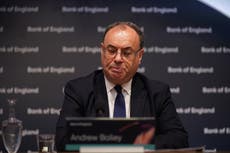A Level: How will student loans be affected by rising interest rates?
Bank of England’s dire new forecast sparks recession fears

The Bank of England has announced its biggest interest rate rise in 27 years as the UK battles soaring inflation, sparking consumer fears about the consequences of a worsening cost of living crisis and the prospect of a looming recession.
The central bank’s nine-member Monetary Policy Committee had already raised interest rates five times this year, overseeing an increase from 0.1 per cent in December 2021 to 1.25 per cent in June, before going one further on Thursday and raising it to 1.75 per cent.
An attempt to put the brakes on runaway inflation – already at a 40-year high of 10.1 per cent and set to swell further – the move marks the first 50 basis point rise since 1995 and ramps up the cost of borrowing to its highest level since December 2008 during the Global Financial Crisis.
While that decision will have repercussions for all manner of personal finance products, from mortgages to savings accounts, credit card debt, pensions and car loans, one area that will be shielded from its immediate impact is student loans.
This is because the UK government moved in June to cap the interest rate on repayments at 7.3 per cent, intervening to prevent a rise from 4.5 per cent to a whopping 12 per cent, which had been forecast by the Institute for Fiscal Studies for implementation by September 2022.
Announcing the decision earlier this summer, then-higher education minister Michelle Donelan said it was intended to bring “peace of mind” to graduates concerned by the dire economic outlook.
“I will always strive for a fair deal for students, which is why we have reduced the interest rate on student loans down from an expected 12 per cent,” she said.
“I want to provide reassurance that this does not change the monthly repayment amount for borrowers, and we have brought forward this announcement to provide greater clarity and peace of mind for graduates at this time.
“For those starting higher education in September 2023 and any students considering that next step at the moment, we have cut future interest rates so that no new graduate will ever again have to pay back more than they have borrowed in real terms.”
Having taken this step, Ms Donelan was promoted to education secretary by Boris Johnson last month during a frantic reshuffle intended to steady a ship rocked by the wave of mass resignations in protest at the prime minister’s scandal-ridden leadership, only to resign 36 hours, making her the shortest-lived Cabinet member in Westminster’s history. She was swiftly replaced by James Cleverly.
While the decision to cap that interest rate on students – calculated by adding 3 per cent to the retail price index measure of inflation – was broadly welcomed, Larissa Kennedy, president of the National Union of Students, protested that it was “still cruelly high”.
“While some graduates might breathe a sigh of relief that the interest rate is no longer in double figures, ministers should be prioritising providing urgent cost of living support here and now,” she said.
She said that the government “should introduce rent protections, offer basic levels of maintenance support and announce a cost of living payment for all students”.
As Ms Kennedy suggests, the Department of Education’s move does not shield students from the wider consequences of inflation, such as the increased price of consumer goods in supermarkets and on the high street.
But Bloomberg, for one, has managed to find a positive spin on the situation, arguing that the increase in interest rates could ultimately end up benefiting students on the basis that, if it succeeds in bringing down inflation as the Bank of England intends, student loan rates will ultimately fall too.
Full details on the repayment of student loans for graduates and postgraduates is available on the government’s website.
Join our commenting forum
Join thought-provoking conversations, follow other Independent readers and see their replies
Comments


Bookmark popover
Removed from bookmarks